|
De Franse schrijver Florian Zeller werd op 28 juni 1979 in Parijs geboren. Zie ook alle tags voor Florian Zeller op dit blog.
Uit: Climax (Vertaald door William Rodarmor)
„In this story, Sofia was a little like Poland.
Nicolas knew he would be the big loser in such an expansion. He already found it hard enough to make one woman come; the idea of having twice as much work, in the face of fierce competition, seemed more than he could handle. Unless, speaking purely technically, a transfer of competence occurred, which was something he absolutely didn’t want. Besides, how could he admit to his desire for another woman, right in front of Pauline? Let’s call this impulse erotic sovereignism, which would be the logical opposite of erotic federalism.
Erotic sovereignism might be thought infantile, and with good reason. Men, at least most of the time, are big children. Here’s proof: exhausted by all these considerations, which he suddenly found completely futile, Nicolas drank his coffee and went back to bed.
The architects of Europe thought that two things were essential for the people of the continent to feel European: a flag and an anthem. The matter of the flag was settled in 1955, and presented no particular difficulty. But that wasn’t the case with the anthem. People hoped a new world would emerge after the horror of the war, and a number of composers wanted to be part of that. They included a composer from Lyons named Jehane-Louis Gaudet. In 1949 he sent his Chant de la paix to the president of the Council of Europe and crossed his fingers. After all, wasn’t it a golden opportunity for an unknown artist to become famous?
After the Chant de la paix was presented to the Council, the president telephoned the composer to personally thank him for his contribution. Unfortunately, he said, it would be very difficult to adopt this magnificent composition as the European anthem.
“Why?” asked Gaudet in surprise.
“Because we are required to be unanimous.”
It turns out that on the day the council met, a little man with a mustache, a Dutchman from Rotterdam, had felt that the Chant de la paix was too…. The Council president had forgotten the word that had been used.
“Too what?” asked the composer. He felt a little annoyed, but was prepared to rewrite a few bars to satisfy the gentleman from Rotterdam if necessary”
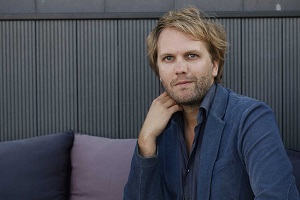
Florian Zeller (Parijs, 28 juni 1979)
De Poolse dichter, vertaler en uitgever Ryszard Krynicki werd geboren op 28 juni 1943 in St.Valentin, Lager Wimberg, Oostenrijk. Zie ook alle tags voor Ryszard Krynicki op dit blog.
Yes, I am
For many days now
I've been walking back
through hazy Krakow
but I'm not yet home
From the pink sand
and pink limestone
of my Jerusalem.
I'm still returning
From the Wailing Wall.
I still wander
in the narrow labyrinth
of the Via Dolorosa.
Sometimes
the gap above my head
reveals the moon
still full.
I still wander
in the beginning.
Are you a Jew?
an old Hassidim asks,
probably younger than I am.
Yes, I'm a poet —
I want to say for once
but I just smile
and answer:
Schalom, achi!
This year
This year
I bore no fruit,
just leaves
that leave no shadows
I am afraid, Rabbi,
I am afraid, Lord,
that I’ll be cursed by him who hungers,
weary
on the endless road
to Jerusalem
Vertaald door Clare Cavanagh
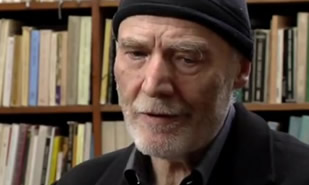
Ryszard Krynicki (St.Valentin, 28 juni 1943)
De Amerikaanse schrijver en journalist Mark Helprin werd geboren in New York op 28 juni 1947. Zie ook alle tags voor Mark Helprin op dit blog.
Uit: A Soldier of the Great War
“On the ninth of August, 1964, Rome lay asleep in afternoon light as the sun swirled in a blinding pinwheel above its roofs, its low hills, and its gilded domes. The city was quiet and all was still except the crowns of a few slightly swaying pines, one lost and tentative cloud, and an old man who rushed through the Villa Borghese, alone. Limping along paths of crushed stone and tapping his cane as he took each step, he raced across intricacies of sunlight and shadow spread before him on the dark garden floor like golden lace.
Alessandro Giuliani was tall and unbent, and his buoyant white hair fell and floated about his head like the white water in the curl of a wave. Perhaps because he had been without his family, solitary for so long, the deer in deer preserves and even in the wild sometimes allowed him to stroke their cloud-spotted flanks and touch their faces. And on the hot terra cotta floors of roof gardens and in other, less likely places, though it may have been accidental, doves had flown into his hands. Most of the time they held in place and stared at him with their round gray eyes until they sailed away with a feminine flutter of wings that he found beautiful and not only for its delicacy and grace, but because the sound echoed through what then became an exquisite silence.
As he hurried along the Villa Borghese he felt his blood rushing and his eyes sharpening with sweat. In advance of his approach through long tunnels of dark greenery the birds caught fire in song but were perfectly quiet as he passed directly underneath, so that he propelled through their hypnotic chatter before and after him like an ocean wave pushing through an estuary. With his white hair and his thick white mustache, Alessandro Giuliani might have seemed English were It not for his crème-colored suit of distinctly Roman cut and a thin bamboo cane entirely inappropriate for an Englishman. Still trotting, breathless, and tapping, he emerged from the Villa Borghese onto a wide road that went up a hill was flanked on either side by a row of tranquil buildings with tile roofs from which the light reflected as if it were a waterfall cascading onto broken rock.
Had he looked up he might have seen angels of light dancing above the throbbing bright squares—in whirlpools, will-o’-the-wisps, and golden eddies—but he didn’t look up, for he was intent on getting to the end of the long road, to a place where he had to catch a streetcar that, by evening, would take him far into the countryside. He would have said, anyway, that it was better to get to the end of the road than to see angels, for he had seen angels many times before. Their faces shone from paintings; their voices rode the long and lovely notes of arias; they descended to capture the bodies and souls of young children; they sang and perched in the trees; they were in the surfs and the streams; they inspired dancing; and they were the right and holy combination of words in poetry. As he climbed the hill he thought not of angels and their conveyances, but of a motorized trolley. It was the last to leave Rome on Sunday, and he did not want to miss it.”

Mark Helprin (New York, 28 juni 1947)
De Oostenrijkse schrijfster Marlene Streeruwitz werd geboren op 28 juni 1950 in Baden bij Wenen. Zie ook alle tags voor Marlene Streeruwitz op dit blog.
Uit: Yseut
"Das Auto stand auf dem Damm. Hoch über der Landschaft rechts. Der Fluss. Links. Sie war ganz allein. Kein anderes Auto auf der Dammstraße. Niemand auf den Feldern. Heiß. Es war Morgen, aber die Sonne sehr heiß. Das war keine Septembersonne. Am Wasser der Auwaldstreifen schütter. Ausgeholzte Strecken, in denen die Waldrebe den Boden entlang kroch. Am Ende der Lianen die Blätter herbstlich rot. Wieder einzelne Stämme der riesigen Schafgarben. Dazwischen der Blick auf das Wasser. Eine dunkle weiche Fläche. Yseut hätte nicht sagen können, in welche Richtung das Wasser floss. Und dann. Sie musste nach rechts schauen. Etwas hatte sich bewegt. Sie suchte. Was war das gewesen. Und dann sah sie es. Bei einem verfallenen Bauernhaus bewegte sich etwas. Das Haus weit drinnen inmitten der Felder. Die Mauern waren an zwei Seiten eingebrochen. Das Dach eingesunken. Hohe Büsche rundum. Ihr wurde sofort übel.”
(...)
"Begehren. Stieg auf. Wieder. Stieg wieder auf. Erfasste sie. Schüttelte sie. Ein lebendiges Ding über sie in sie hergefallen. Atemholen dagegen. Zischend atemholen dagegen. Ein Schluchzen. Das war doch befriedet gewesen. Ein Gleichgewicht. Sie hatte ein Gleichgewicht. Gehabt. Erworben. Ein ruhiges Maß war das gewesen. Ebener Grund, auf dem zu stehen. Von dem zu planen. Von dem aus ihre Verteidigung. Sicher und ruhig. Ruhig. Ruhe. Nur Ruhe. Aber. Sie war wieder gejagt. Sie war wieder gehetzt. In ihr. Es jagte in ihr. Es hetzte in ihr. Der Magen. Bis zur Kehle hinauf verschnürt. Hall. Widerhall. Im Bauch. In der Brust. Ein Hall von all den Zeiten, in denen es so gewesen war. Begehren. Es war wohl nie befriedet gewesen. Zu keiner Zeit kein Hunger nach Auflösung. Nach Vergehen. Sich verlieren. Versinken. Sich in Arme werfen und dann nichts. Kein Morgen mehr nach der Nacht und keinen anderen Namen als den einen. Dann. Sie hätten einander zufallen müssen und alles voneinander wissen und sonst nichts. Aber. Nicht ein Mal hatte sie das gehabt. Kein einziges Mal. Nie.”
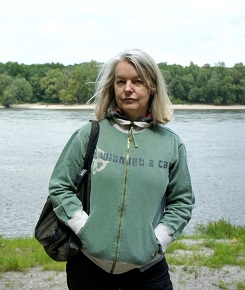
Marlene Streeruwitz (Baden, 28 juni 1950)
De Nederlandse dichteres en schrijfster Fritzi Harmsen van Beek werd geboren in Blaricum op 28 juni 1927. Zie ook alle tags voor Fritzi Harmsen van Beek op dit blog
Honderd jaar
later, door het opperwezen in een boom herschapen,
(nakend in een tropisch oerwoud aan de grond gezet,
voor straf nu bloeiend onophoudelijk, bevrucht on-
slapend en onpratend zonder enkele omhelzing), vond
de vroegere mevrouw O. in haar onmetelijke toppen een
dagboekblaadje, onherkenbaar ook veranderd in zo'n onheil-
spellende vlinder die Morpho heet, waarop met grote
moeite zij herlas: ‘Vrijdag 9-8-63, iets kan de plek
niet van iets anders innemen en identiciteit bestaat dus
niet. Denk aan de schijnbaar vele bladeren.’ Te zelfder
tijd, daar waar haar stam zich vorkte voor het eerst
vanaf de grond, zat een nog onaanzienlijker insect dat
wegens zijn voorheen geringere verdienste van onverzonden
briefje door de schepper slechts bevorderd was tot
machteloze mate van vliesvleugeligheid. Op hem viel al
sinds jaren niets te lezen, maar, uit het hoofd geleerd,
sprak hij onafgebroken en van generatie op generatie: ‘O
Muizenpoot, ik wil je kopen of ruilen, laten we weglopen
naar waar de rivier in zee stroomt en de mensen een
andere taal spreken en andere waterdieren eten. O enz....’
Zo namen letterlijk bezit van haar die zonder hand of
mond, haar zo verfomfaaide gedachten. Toen begonnen haar
bladeren te verbleken en te vallen als zwakke vlinders,
als pakken gedevalueerd bankpapier, tot op de humus van
bedoelingloze wildernis. Toen werd zij, later, omgehakt,
haar nervig, brandschoon hout verhandeld en nog vindt men wel,
bij sommige betergesitueerde planeetbewoners, van haar
glanzendheid de zachte schim, een soort gepolitoerde vlam
aan buitenzij den van reusachtige televisieontvangst-
apparaten, opgesteld in die volstrekt belangloze bacterie-
vrije zitvertrekken, waar geen kevers wonen.
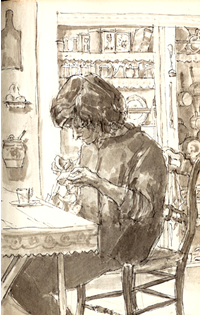
Fritzi Harmsen van Beek (28 juni 1927 – 4 april 2009)
Portret door Peter Vos
De Italiaanse schrijver Luigi Pirandello werd op 28 juni 1867 geboren in de villa 'Caos' (chaos) in de buurt van Agrigento. Zie ook alle tags voor Luigi Pirandello op dit blog.
Uit: The Late Mattia Pascal (Vertaald door Arthur Livingston)
“For some two years I held a position—mouse−catcher and custodian in one—in the so−called Boccamazza library. Away back in the year 1803, a certain Monsignor Boccamazza, on departing from this life, left his books as a legacy to our village. It was always clear to me that this venerable man of the cloth knew nothing whatever about the dispositions of his fellow−citizens. I suppose he hoped that his benefaction, as time and opportunity favored, would kindle a passion for study in their souls. So far not a spark has ever glowed therein, as I may state with some authority, and with the idea of paying a compliment, rather than not, to my fellow−townsmen. Indeed, our village so little appreciated the gift of the reverend Boccamazza that it has, to this day, refused money even for putting his head, neck, and shoulders into marble; and for years and years the books he left were never removed from the damp and musty store house where they had been piled after his funeral. Eventually, however, they were transported (and imagine in what condition!) to the unused Church of Santa Maria Liberale, a building which, for some reason or other, had been secularized. There the town government entrusted them to any one of its favorites who was looking for a sinecure and who, for two lire a day, was willing to care for them (or to neglect them if he chose), and to stand the noxious odor of all that mildewed paper.
This plum, in the course of human events, fell to me, and I must add that the first day of my incumbency
gave me such a distaste for books and manuscripts in general (some of those under my charge were very precious, I am told) that I should never, never, of my own accord, have thought of increasing the number of them in the world by one. But, as I said, my case is a very strange one; and I now agree that it may prove of interest to some chance reader, who, in fulfillment of Monsignor Boccamazza's pious hope, shall some day wander into the library and stumble upon this manuscript of mine. For I am leaving it to the foundation, with the understanding that no one shall open it till fifty years after my third, last, and final death. There you have it, exactly!”
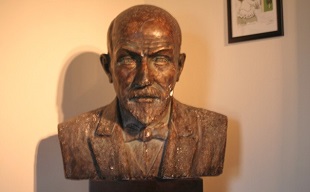
Luigi Pirandello (28 juni 1867 - 10 december 1936)
Borstbeeld in het Pirandellohuis in Agrigento
De Franse schrijver, filosoof en componist Jean Jacques Rousseau werd geboren in Genève op 28 juni 1712. Zie ook alle tags voor Jean-Jacques Rousseau op dit blog.
Uit:Bekentenissen (Vertaald door Leo van Maris)
“Vanaf hun achtste of negende wandelden ze iedere avond samen over de promenade de la Treille. Toen ze tien waren konden ze niet meer buiten elkaar. Genegenheid en zielsverwantschap versterkten in hen het gevoel dat door gewoonte was ontstaan. Beiden, ontvankelijk en gevoelig van aard, wachtten alleen maar op het ogenblik dat ze dezelfde gesteldheid in een ander zouden vinden of liever nog, dat ogenblik wachtte op hen en elk van de twee stortte zijn innerlijk uit in het eerste hart dat zich daarvoor opende. Het lot, dat hun liefde leek te dwarsbomen, wakkerde deze alleen maar aan. De jonge minnaar, niet bij machte zijn geliefde voor zich te winnen, werd door smart verteerd. Zij raadde hem aan op reis te gaan om haar te vergeten. Hij reisde vergeefs en kwam weer thuis, verliefder dan ooit. Hij vond haar die hij beminde weer terug, liefdevol en trouw. Na deze beproeving bleef hun niets anders over dan elkaar hun leven lang lief te hebben. Dat zwoeren ze en de zegen van de hemel rustte op hun eed.
Gabriel Bernard, een broer van mijn moeder, werd verliefd op een van de zusters van mijn vader, maar zij wilde alleen maar de vrouw van de broer worden als haar broer de zuster zou trouwen. De liefde bracht alles in orde en beide huwelijken werden op dezelfde dag gesloten. Zo was mijn oom de man van mijn tante en hun kinderen werden in dubbel opzicht mijn volle neven en nichten. Een jaar later werd uit elk van beide huwelijken een kind geboren, maar vervolgens moesten beide echtparen toch weer uit elkaar.
Mijn oom Bernard was vestingbouwkundige. Hij nam onder prins Eugenius dienst in het Duitse Rijk en Hongarije. Hij onderscheidde zich bij de belegering en de slag van Belgrado. Mijn vader vertrok na de geboorte van mijn enige broer naar Constantinopel, omdat hem was gevraagd klokkenmaker te worden aan het hof van de sultan. Tijdens zijn afwezigheid bezorgden de schoonheid, de geestigheid en de talenten van mijn moeder haar verschillende bewonderaars. Mijnheer de la Closure, de Franse zaakgelastigde, was een van degenen die het meest naar haar gunsten dongen.”
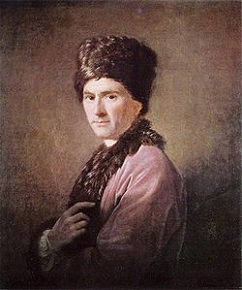
Jean-Jacques Rousseau (28 juni 1712 - 2 juli 1778)
Portret van Jean-Jacques Rousseau in Armeense kledij door Allen Ramsey, 1766
De Vlaamse schrijver dichter, vertaler en scenarist Anton van Wilderode (pseudoniem van Cyriel Paul Coupé werd geboren in Moerbeke op 28 juni 1918. Zie ook alle tags voor Anton van Wilderode op dit blog.
Wake
Maar na de kaars en de gebeden
ben ik den ganschen nacht bij u;
mijn kindje, ik ben àfgestreden,
ik vlei me neer naast u.
Ik beid niet meer uw ademhalen
onder het koele linnenblank,
een droefheid als van nachtegalen
houdt mij van spijs en drank.
Ik lig naast u en weenend neder,
de nacht dekt alle hindernis,
ik tast uw kleine oogen weder,
de levenlooze, in hun nis;
ik strijk uw korte kinderharen
dit onherstelbare gelaat
waaraan mijn dronken lippen waren
en dat nu hulpeloos vergaat.
Maar 'k weet uw ziel aan allen hinder,
aan wereld en verlies ontgaan,
gelijk een witte zomervlinder
voor God in vaste trilling staan.
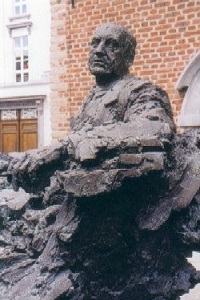
Anton van Wilderode (28 juni 1918 - 15 juni 1998)
Standbeeld in Sint Niklaas, gemaakt doorWilfried Pas.
De Argentijnse schrijver Juan José Saer werd geboren in Serodino op 28 juni 1937. Zie ook alle tags voor Juan José Saer op dit blog.
Uit: Ermittlungen (Vertaald door Hanna Grzimek)
„Obwohl sie allem Anschein nach ganz harmlos sind, können sie einen durchaus reizen, und es ist vielleicht gerade das Bewußtsein ihrer eigenen Zerbrechlichkeit, das sie paradoxerweise unverwundbar werden läßt und ihren Meinungsäußerungen eine gewisse Unverfrorenheit verleiht; mitunter werden sie so zur führenden Stimme des Zeitalters, da sie die Hintergründe des Weltgeschehens mit ihren strengen Bemerkungen an der Tür zur Bäckerei, den soziologischen Analysen in den Teesalons, den prompten Kommentaren, die sie allein und mit lauter Stimme zu den Fernsehbildern machen, deutlicher erfassen als die Reden der sogenannten Politiker, Spezialisten der Geisteswissenschaften und Journalisten.
Die tägliche Unterhaltung zwischen einer Greisin und ihrem Kanarienvogel, während sie diesem den Käfig säubert, stellt vielleicht die einzig ernstzunehmende Debatte der modernen Zeit dar, nicht jene, die vor der Kamera ablaufen, vor Gericht oder an der Sorbonne: Während ihnen alles andere verloren ging, haben sie ein Privileg gewonnen, nämlich, daß sie nichts mehr zu verlieren haben, und so herrscht in ihrer Redeweise bedenkenlose Ehrlichkeit vor, die bisweilen nicht einmal in Worten zum Ausdruck kommt, sondern vielmehr durch Schweigen und bedeutsame Gesten, etwa durch ein keineswegs erklärliches Kopfschütteln, und durch Blicke, in denen Begeisterung und Verachtung nicht auseinanderzuhalten sind. Irgendetwas dazwischen, sei es gut oder schlecht, entweicht ihren runzeligen Lippen und ruft bei weniger selbstzufriedenen Gesprächspartnern Lachen, Erstaunen und sogar Empörung hervor. Aber wie wir wissen, leitet die Redensart „wie meine Großmutter schon sagte" immer irgendeine Ungereimtheit ein, über die wir schon im voraus lachen müssen, und in den Märchen und Volksliedern hadern alte Frauen vorzugsweise mit dem Teufel. Kleinen Kindern mag man damit Angst einjagen, für alle anderen besitzt die Boshaftigkeit alter Leute letzten Endes eine gewisse Komik, so wie ein Versprecher oder ein Anachronismus.“
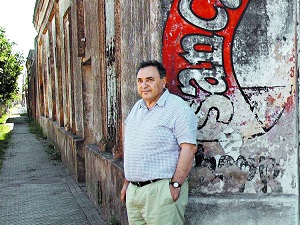
Juan José Saer (28 juni 1937 - 11 juni 2005)
Zie voor nog meer schrijvers van de 28e juni ook mijn blog van 28 juni 2014 deel 2.
|



